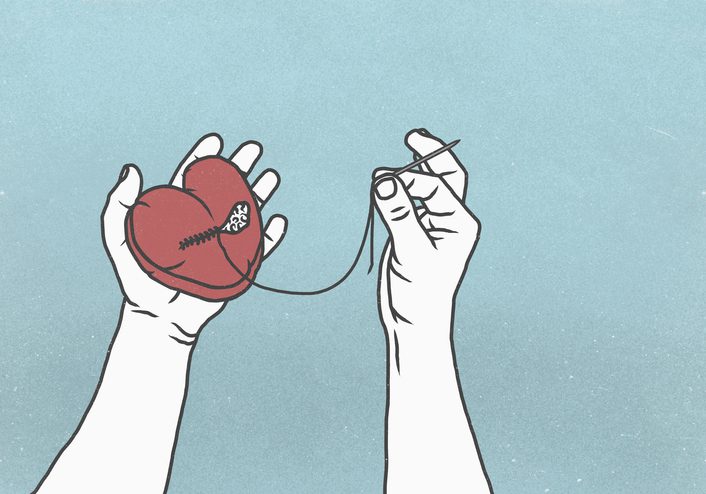Ah, relationships. Everyone’s talking about them– as we always have. And these discussions have expanded far beyond the intimate relationships we– or our friends– are part of. Though it is by no means the starting point of relationship anxiety, social media has given us access to a far larger field for comparison. If you’re looking to find evidence that you and your partner are (or aren’t) in the right relationship, you’ll have an easier (or more confusing) time than ever before.
Some people probably aren’t in the best relationships. But even in clear cases when they can’t be safe, healthy, or happy, people can have a really hard time leaving an intimate relationship. Often, relationships end when someone moves away or things just fizzle out. But in between the start and end of any relationship, there can be a lot of confusion and torment along with the good feelings.

When people say things like “You just know when they’re the one,” it doesn’t mean they actually know. They might feel a deep and meaningful connection– but that doesn’t mean they have any magical knowledge of billions of other people, allowing them to make a definitive judgment. There is always doubt and ambiguity in human relationships, whether they’re intimate, platonic, or even familial.
This doubt is often most pronounced in intimate connections. Just about everyone wonders how their partner really feels, whether or not they could be happier with someone else, and so on. But what about when these relationship thoughts become debilitating and leave someone feeling like they need to respond to their discomfort whenever doubt emerges?
People dealing with Relationship OCD or ROCD – as many psychologists and people with OCD call it– struggle with obsessions and compulsions related to relationships and their feelings about them. In this subtype of OCD, the fundamental uncertainty of intimate relationships can feel unbearable, and any hint of imperfection might launch an obsessive-compulsive cycle. Compulsions can consume a lot of time and energy, and they tend to make relationships more, rather than less, difficult.

ROCD Thoughts, Obsessions & Compulsions
Here’s an example using a common model for the obsessive-compulsive cycle:
- Trigger: Made eye contact with someone attractive
- Intrusive Thought: I could be dating someone more attractive
- Catastrophic Assessment: The thought feels important, even urgent
- Obsession: I could be stuck in the wrong relationship forever
- Distress: As obsessions continue, the sense of inner tension increases
- Compulsions:
- Googling “Is it normal to find strangers more attractive than my partner?”
- Asking a friend if they think you could do better
No single one of these steps is, on its own, “abnormal” or “unhealthy.” But when they turn into a repetitive cycle that reduces our quality of life by consuming a lot of time and energy, we might be looking at symptoms of OCD.
The line between “good” and “bad” intimate relationships is often unclear. So, how can someone know when they’re actually in a bad relationship? When someone is disrespected, ignored, abused, or manipulated, these are signs that the relationship is unhealthy. The rest can be murkier, and any broad claim about what constitutes the “right” relationship will quickly prove problematic.
Everyone wonders about their choice of partner, the other possibilities out there, and the way their partner might see them. These questions regularly emerge even in relationships that both partners perceive as happy and healthy. But when someone feels a seemingly irresistible urge to figure these things out and spends a lot of time trying to do so, it’s worth talking with a therapist trained in treating the symptoms of Relationship OCD.
Treating ROCD: What type of therapy helps people with Relationship OCD?
The good news is that Relationship OCD is just one form of obsessive-compulsive disorder, which is highly treatable with exposure and response prevention (ERP) therapy. Conducted by a licensed OCD therapist, ERP is the most reliable way to significantly decrease the amount of distress caused by OCD. Trying to fight our thoughts directly is a losing battle, so ERP works by helping people resist their compulsions (like taking relationship tests online). This, in turn, gradually teaches us that we can tolerate intrusive thoughts about our relationship—we don’t need to do anything about them after all.
Although this might sound simple, it involves careful planning and constant adjustment to overcome ROCD. That means ERP is most effective when practiced with a therapist who has received specialized training in treating ROCD symptoms. An OCD-trained therapist knows what to anticipate when you describe your thoughts and behaviors, and how to build your ROCD personalized treatment program. Their expertise is in teaching you how to manage your OCD and make positive changes in all areas of your life—not just your relationship.
This is the same training all of our NOCD Therapists receive. The goal of NOCD is to reduce your OCD symptoms within just a few weeks of live one-on-one video therapy. You’ll be welcomed into our supportive peer community, with 24/7 access to personalized self-management tools built by people who have been through severe OCD and successfully recovered using ERP.
If you are struggling with Relationship OCD, there is hope! The first step is finding the right help by seeking out a provider trained in treating OCD with Exposure and Response Prevention (ERP) Therapy.
Schedule a free call today with a member of the NOCD clinical team to learn more about how a licensed OCD therapist can help you get better. ERP is most effective when the therapist conducting the treatment has experience with OCD and training in ERP. At NOCD, all therapists specialize in OCD and receive ERP-specific training. This consultation is free and doesn’t take very long—and it could be one of the most important calls you ever make.
Please note that this post is an exploration of a common question from our community members. It is not intended to diagnose.

